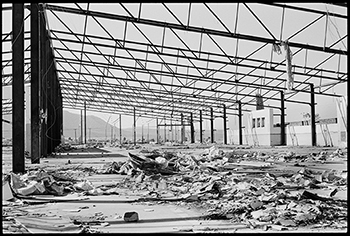Latest News Archive
Please select Category, Year, and then Month to display items
31 January 2024
|
Story EDZANI NEPHALELA
|
Photo ANJA AUCAMP
 Dr Martin Laubscher’s thesis, crowned with the Andrew Murray-Desmond Tutu Prize, is testament to the university’s unwavering commitment to scholarly excellence.
Dr Martin Laubscher’s thesis, crowned with the Andrew Murray-Desmond Tutu Prize, is testament to the university’s unwavering commitment to scholarly excellence.
In a historic triumph that reverberates over four decades since its inception, the UFS has clinched the coveted
Andrew Murray Prize – now renamed the Andrew Murray-Desmond Tutu Prize – for the first time. Standing shoulder to shoulder with institutions such as the University of Pretoria (UP) and Stellenbosch University (SU), this achievement marks a significant milestone in the UFS’ journey.
At the heart of this accomplishment lies the profound contribution of
Dr Martin Laubscher, distinguished Senior Lecturer specialising in Practical and Missional Theology in the
Faculty of Theology and Religion. Dr Laubscher’s dedication and scholarly prowess culminated in the groundbreaking work titled
Publieke teologie as profetiese teologie? (Public theology as prophetic theology), a revised edition of his doctoral thesis, which was originally crafted at Stellenbosch University in 2020, with a focus on the eminent Karl Barth.
Dr Laubscher received the Andrew Murray Prize for Theological Books in Afrikaans for his research and insightful analysis. The journey started when he realised, under the guidance of his study leader,
Prof Dion Forster, that his script had the potential to be published in Afrikaans. Sun Media’s interest in publishing this work in Afrikaans, led to it being the first-ever published thesis in Afrikaans. Dr Laubscher recalls, “I was grateful and excited about Sun Media’s interest. The book emerged within a year, and during a celebratory launch Prof Forster suggested I submit it for the Andrew Murray Prize.”
Earlier this year, Dr Laubscher was excited to learn that he was being shortlisted for the prestigious award. Reflecting on the significant moment, he shares, “The elation I felt upon receiving the news was unparalleled. I was not only celebrating a personal triumph, but also etching my name as the first laureate from our faculty to secure this prestigious accolade.”
Award-winning photographer exhibits ravages of war, 25 May 2016 until 17 June 2016
2016-06-02

The ruins of the Dimbaza Border Industrial Park built
in the 1970s as a source of cheap labour for industrialists
and ostensible employment for Ciskei Homeland citizens.
This industrial zone collapsed after 1994.
Photo: Images courtesy of the Galerie Seippel.
All images © Cedric Nunn
Cedric Nunn’s latest photographic exhibition, Unsettled: One Hundred Years War of Resistance by Xhosa Against Boer and British, opened on 25 May 2016 at the Johannes Stegmann Art Gallery of University of the Free State, and will run until 17 June 2016. Since 2014, the exhibition has travelled through South Africa and the USA as well as Germany.
The photographer, documentary film-maker, and artist’s photographic journey was launched in the early 1980s in Durban. In 2011, he won the first FNB Joburg Art Fair Award.
Narratives of the victors and the vanquished
Unsettled deals with the nine wars that Xhosa people were subjected to between 1779 and 1879 in their fight against Afrikaner and British colonial settler forces. Nunn’s art seeks to instigate social change, and highlight lesser-seen aspects of society.
The work emanated from his awareness of a notable gap in the telling of this piece of South African history, as well as the fact that, to date, little has been done to memorialise these acts of colonial aggression and Xhosa resistance. He decided to document the land where these struggles took place.
“Through revisiting this painful past in the contemporary scenes of today, this work attempts to place the present in its factual context of dispossession and conquest,” said Nunn.
Unsettled forms the first component of what will be a trilogy. The next component will address the legacy of colonial dispossession through “bringing ‘the first inhabitants’ back into the picture by giving a select number of self-describing Khoi, Griqua, and San or Bushmen a contemporary face and presence”. The final component will look at slavery.